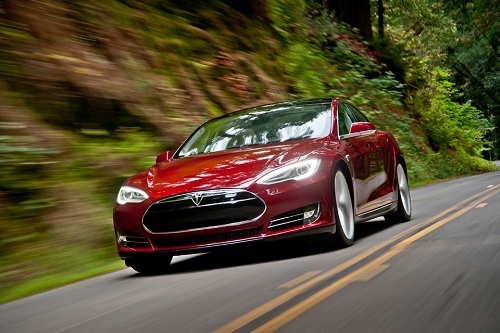| Back to Back Issues Page |
 |
|
Electric Cars And Hybrids, Issue #001 -- teaser here July 16, 2012 |
Tesla and Electric Car adoptionCar buyers are notoriously fond of focusing only on the purchase price of new vehicles, without much thinking about the total cost of ownership. In other words, plugging in your electric car to recharge it is the equivalent of paying a dollar a gallon for gasoline--forever. Gasoline is high, higher, or very much higher; electricity stays cheap regardless of what happens to oil prices. Source: cool-electric-cars.com via Cool on Pinterest
Anyone watching the electric vehicle industry’s progress over the past few years has probably been dismayed at the glacial adoption rate of EVs. It’s still rare to spot an EV on the road, even in major metropolitan areas. There are a handful of macroeconomic factors at play that will influence lithium-ion battery prices, including energy prices (which could plunge because of new gasoline extraction technologies), regulations for fuel economy and safety in the auto industry, technology, and demand - Nevertheless, oil prices will impact whether automakers favor battery electric vehicles (BEV), plug-in hybrids, or even today’s hybrid electric vehicles. The report explains: "Scenarios featuring a relatively quick decline in battery prices and flat or rising petroleum prices favor battery-electric-vehicle (BEV) strategies, as the exhibit indicates. Those anticipating slower declines in battery prices, as well as increases in petroleum prices, favor plug-in hybrid electric vehicles (PHEV) or, perhaps, today’s hybrid-electric vehicles (HEV)." If McKinsey is correct and lithium-ion battery prices drop, power companies will have to start seriously thinking about how a glut in EVs will affect the power grid (a recent report from MIT lists all the things that will need to happen to make sure the grid can handle EVs, solar, and wind power). And if we’re lucky, automakers will start looking beyond lithium-ion batteries in the coming decades to better-performing lithium-air batteries - Source: teslamotors.com via Cool on Pinterest Tesla is clearly winning at creating the electric car marketplace. And there's no chance traditional auto companies like GM or Ford will catch them as this market grows and transforms competition. Sales expectations are not good for U.S. auto companies. Automakers are resorting to fairly radical promotional programs to spur sales. Chevrolet is offering a 60-day guarantee. And Chrysler is offering 90 day delayed financing. These incentives are designed to make you want to buy a car, when you really don’t want to buy a car. At least, not the cars they are selling. Tesla’s initial offering was a car that provided remarkable 0-60 speed performance, top end speed around 150mph and superior handling. Additionally it looked great in a 2-door European style roadster package. Simply, a wildly better sports car than anything else made in the USA – and most of Japan. Oh, and to make this be superior they chose to make it all-electric, as well. It was easy for Detroit automakers to scoff at this effort – and they did. In 2009, while Detroit was reeling and cutting costs – as GM killed off Pontiac, Hummer, Saab and Saturn – the famous Bob Lutz of GM laughed at Tesla and said it really wasn’t a car company. He proclaimed Tesla would never really matter, because as it tried to grow up it would never compete effectively. According to Mr. Lutz, nobody really wanted an electric car, because it didn’t go far enough, it cost too much and the speed/range trade-off made them impractical. Especially at the price Tesla was selling them. And who would want a roadster? But, in 2009 Tesla sold 100% of its production. And opened its second dealership. As manufacturing plants, and dealerships, for the big brands were being closed around the world. |
| Back to Back Issues Page |

